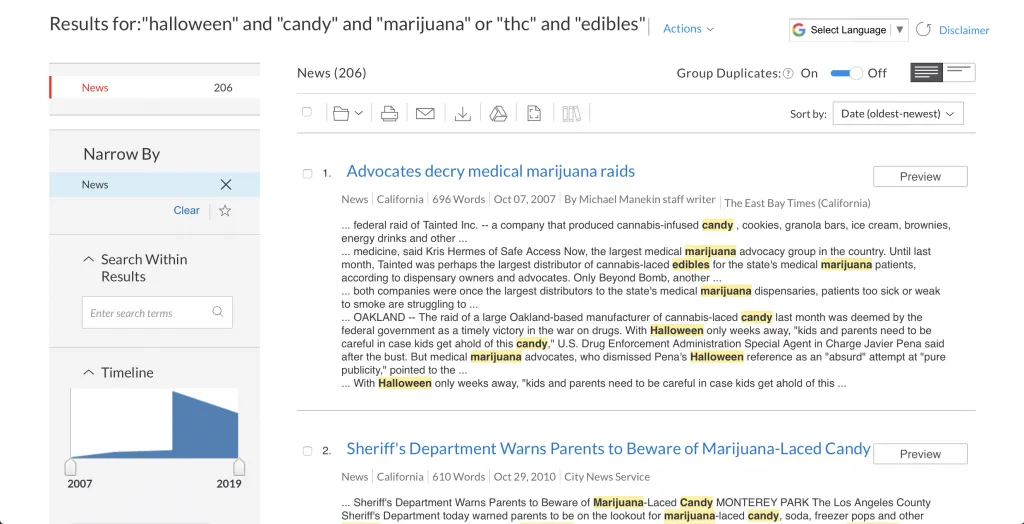The Sociology of Halloween
The sociology of halloween can take on many forms using any of the endless theoretical perspectives offered through the discipline of sociology. This sociological analysis of Halloween takes on urban legends in the form of cannabis-infused candy.
You know that irrational fear that folks tend to have around Halloween that their neighbors are going to pass out free cannabis-infused edibles to their children? Well, using a social problems framework, sociology can help us understand where that fear comes from and whether or not it is actually irrational.
Sticky Icky Social Problems
A social problems framework in sociology typically includes understanding how public discourse (e.g., media outlets such as news sources, social media, popular blogs, etc.) construct narratives around public issues. For example, a sociologist might ask “how does news discourse construct the problem of political polarization in the U.S.?” Using news articles as data, that sociologist would systematically collect and analyze data on the topic of political polarization to grasp how the problem is perceived and constructed through public discourse.
The topic of this piece, however, is not political polarization, but rather the discourse around cannabis-infused edibles and Halloween candy that has emerged since states started legalizing medical and recreational cannabis in the latter-half of the 1990’s. Joel Best, a sociologist known for his work on social problems and what’s been termed Halloween sadism—or “the practice of giving contaminated treats to children during trick-or-treating”—provides a useful framework for understanding fear-mongering around kids getting more than a sugar rush from their Halloween candy.
Although Best didn’t specifically analyze the discourse related to children receiving free edibles in their candy sacks, he did analyze the discourse on child deaths caused by Halloween sadism. What he found, was no press coverage on any said incident. He makes the reasonable assumption that if such an incident did occur, it would be covered in the press. However, this doesn’t mean for certain that no child deaths by Halloween sadism occurred in the years prior to his original study, which was published in 1985.
A Chronic Urban Legend
What Best’s research tells us, is that public discourse has potential to construct urban legends, which he and his co-author Gerald T. Horiuchi describe as a product of social strain in society. To say the legalization of cannabis across the country has initiated social strain around the topic would be anything but false. Legalizing “the ganja” is a frequent topic of discussion in political arenas, and if there is anything in this piece that relates back to my earlier example of political polarization, the debate around legalizing cannabis is it.
The social strain Mary Jane brought with her new legal status coincided with an increased discussion on cannabis-related Halloween sadism. A quick search on Nexis Uni (previously known as Lexis Nexis, an online database providing access to public discourse from newspapers to news broadcast transcripts) tells us this discourse slowly began to emerge in 2007 spiking in 2014 just two years after Colorado became the first state in the national to legalize recreational cannabis.

Pot-Pops in High Demand
There has been a plethora of novel discourse on this “problem” just in the past few years, with some notable mentions like the public wanting to inspect all your children’s Halloween candy before consumption, which cam from the Johnstown Police Department in Pennsylvania. There have also been memes and articles circulating social media meant as friendly, and humorous, reminders that edibles are expensive, and no one is giving them away for free.
But is this fear completely irrational, or is there reason to fear the reefer madness on Halloween? Most sources point towards irrationality. As mentioned, edibles are expensive. A single cannabis-infused lollipop can cost $10, and that’s before taxes which are typically quite high for cannabis products. Some chocolate bars might even cost you $30 before taxes.
Expenses aside, products containing cannabis are often marked such as mandated by many states, making them easily identifiable for parents. There is also the fact that distributing cannabis to minors is a crime, with a punishment likely to deter any sadists from following through. Lastly, according to writers at Leafly, stoners hold a harsh hatred towards doorbells, so it’s unlikely they are participating in trick-or-treating festivities at all.
Final Thoughts on the Sociology of Halloween and Urban Legends
If you want to inspect your children’s candy before they consume it, that is certainly your right and your prerogative. But, to be blunt, our social panic each year around contaminated Halloween candy, and specifically cannabis-infused candy, is nothing more than wide-spread paranoia driven by an urban legend resulting from social strain. Although, perhaps we just need to find the right strain for us that doesn’t result in paranoia.
Read: Sociology and Halloween: The Need for Sociologists
Applied Worldwide Halloween Content on Youtube
Please enjoy this series of Youtube shorts brought to you by Applied Worldwide. This series of videos touches on several sociological concepts applied to Halloween. Happy Halloween everyone!







